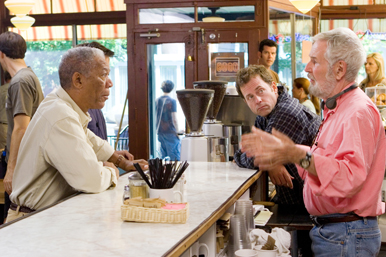Oscar-Winning Director Shares Recipe for Feast of Love

For Academy Award–winning screenwriter and director Robert Benton, it has always been about connections. At the heart of all of his work, from the interaction of Faye Dunaway and Warren Beatty in his first screenplay, Bonnie and Clyde, to the bond of the fast-talking characters played by Lily Tomlin and Art Carney in The Late Show, lies an exploration of the power, the ambiguity, and the magic of human relationships.
Speaking last month after a screening of his new film, Feast of Love, at the College of Communication, Benton said the film attempts to push that exploration deep into the realm of love.
The film, in theaters today, is adapted from Charles Baxter’s 2000 novel of the same name. Morgan Freeman plays a professor who watches as love conjures up mischief and magic in a small Oregon community as he and his wife, played by Jane Alexander, work through their grief over the death of their son. The film also stars Greg Kinnear, who plays a coffee shop owner who can’t seem to find the right woman. Meanwhile, Kinnear’s employees, played by Alexa Davalos and Toby Hemingway, are involved in a romance that defies fate, and his real estate agent, played by Radha Mitchell, is having an affair with a married man, played by Billy Burke.
Benton, who won Oscars for best director and best adapted screenplay for Kramer v. Kramer (1979) and best screenplay for Places in the Heart (1984), talked to BU Today about the beauty and the pain of making the film.
部
What films first influenced you?
I was very lucky, because I had a father who would come home and say to me, “Have you done your homework for today? Let’s go to the movies.” I grew up with movies as a critical part of my life. When I was a senior in high school, I saw a movie called The Asphalt Jungle. It was a film that John Huston made, and the first five minutes are neorealist, and we take that for granted today. When I saw that, I was blown away. When the film ended, my father said, “Okay, let’s go,” and I said, “No, I’m going to stay and watch it again.” That was the first movie I remember seeing twice.
Throughout college, I went to movies constantly. I remember going to see Rashômon, and I thought I was going to see a Japanese movie. When I walked out of that movie, my life had somehow changed. I was not only a different human being than when I walked into that movie, but the world was a different place.
哈
How did you decide the casting for the film? Whose performance surprised you most?
Morgan Freeman had been cast when I took the project. Normally, I would dislike the idea of someone being cast, especially in a role that important. But I could not argue with Morgan — he’s the perfect person for the role. I had one idea for casting, and that was Greg Kinnear. I don’t know what we would have done if we hadn’t gotten him. I think Greg is today’s version of Jack Lemmon — he’s a comic and he can break your heart. The rest of the actors, we spent an inordinate amount of time casting.
The disadvantage of hiring Morgan was that he’s such a heavyweight, which means the people acting with him have to be heavyweights, too. That was not difficult, except in the case of the two young actors. Alexa Davalos I remember seeing for the first time and thinking she wasn’t right. I had imagined her character, Chloe, as this tall, thin blonde, and besides that, Alexa was way too pretty. We saw her again, and I told her, “You’re a wonderful actress and you’ll be a big star.” The last time I said that to an actress, it was Reese Witherspoon. At the end of the movie, she has to lift a lot of baggage while acting with Morgan — who can wipe another actor off the screen — and she did it. With casting, I’m convinced that there’s not one director who can get a great performance without a good actor. I try to give actors a sense of confidence and freedom. As a young director, I tried to direct too much.
What’s your stance on love, and how is it portrayed in the film?
To me, love is the engine of hope. With Baxter’s novel, I saw something I’d never seen before. Diana (Radha Mitchell) is having an affair with a married man, David (Billy Burke), and they fight about the meaning of love. We took it from the book, where David takes the moral high ground, and I believed it. This movie shows the desperation involved in love — it’s not about romance, but how awful and beautiful love can be.
Kimberly Cornuelle can be reached at kcornuel@bu.edu.